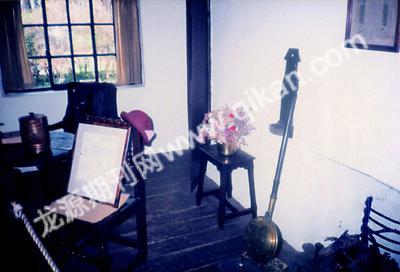Captain Cook’s Cottage in Australia
2009-06-08XiaoXianglong
Xiao Xianglong

Australia as a nation is less than 250 years old if the year 1770 when James Cook discovered the continent is regarded as a starting point for its modern history. The brief history has not produced a big wealth of cultural heritages. For this reason, Australia spares no efforts to protect and preserve its culture. The cottage of James Cook is a perfect example of the government and peoples efforts in this field.
Australia grew rapidly as European immigrants came in waves after the 1770 discovery. In 1901, the Commonwealth of Australia came into being officially with its capital in Melbourne. To celebrate the birth of the nation, a statue of Captain Cook was erected in Sidney where Cook had sailed in and set his steps onto the continent. Postal stamps and portraits were also printed in honor of the English explorer.
However, Australian people would have to travel all the way to Britain to admire the life details of the discoverer. Melbourne celebrated its 100th anniversary in 1934 when an Australian business tycoon offered to buy the former residence of James Cook in Yorkshire, Britain and relocate it to Melbourne.
The proposal caused an instant sensation among Melbourne residents. It received popular support and government approval. As Australia was a member of British Commonwealth, the transaction was clinched with ease. However, the relocation proved to be a challenge. The 400-year-old two-storied wood and stone structure could have easily collapsed. A group of architects studied the cottage and decided to itemize all the parts of the house.All the components were numbered and photographed and catalogued. The disassembled cottage together with clinging plants and artifacts was put into 253 crates and barrels and loaded onto a chartered ship. It sailed cautiously at a smooth pace and took nearly a month to reach Melbourne.
The cottage was re-assembled in Fitzroy Gardens in downtown Melbourne. Fitzroy Gardens is a large expanse of lawns and woods. In front of the cottage stands a bronze statue of Captain Cook, dressed in military uniform and with a navigating chart in the left hand and a telescope in the right. The cottage displays all the original artifacts used by James Cook and his parents. The plants that cover the cottage are original plants from Britain.
Legend of Captain James Cook
James Cook (1728-1779) was a sea legend of Britain. Cook joined the British merchant navy as a teenager and joined the Royal Navy in 1756 when the Seven Years War broke out. He mapped Newfoundland before he was commissioned to embark upon three Pacific Ocean voyages. Thus he achieved first European contact with Australia and the Hawaii islands and first recorded the circumnavigation of New Zealand.

As commander of HM Bark Endeavor, he started his first voyage to the Pacific Ocean on August 26, 1768. It was a voyage to help British astronomers to make solar observations. After the 11-month mission was over, Captain Cook started his sail under the secret instruction of the British Government to explore the southern continent. On April 20, 1770, he saw Australia. After a nine-day voyage along the coastline, the Endeavor sailed into Sidney and Captain Cook set the British Flag on the continent.
He died in a clash with aborigines on a small island of Hawaii on his third Pacific Ocean voyage. □
